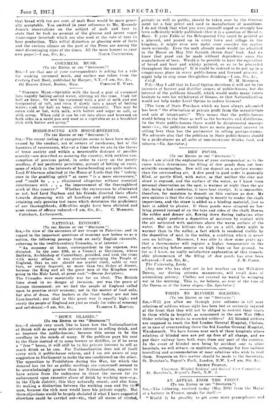NATIONAL ECONOMY.
(TO THE EDITOR OF THE " SPECTATOR.") SIR,—In view of the successes of our troops in Palestine, and in regard to the important questions of economy now before us as a station, the -following passage from an early English chronicle, referring to the twelfth.century Crusades, is of interest:— " An economy at home, correspondent to the expense, was dictated. In the year 1188, at .a Council at Geytinton, where Baldwin, Archbishop of Canterbury. presided, and took the cross with many .others, it was enacted concerning the People of England, that no one should use scarlet cloths, sable or vain furs, or vertes laqueciti, or more than two dishes at dinner, because the King and all the great men of the Kingdom were going to the Holy Land, at great eoat."—Decetn Scriptores. The Crusades were essentially war for an ideal. The British isles stood -in no danger of invasion, nor was the peace of Europe threatened; yet we find the people of England called upon to practise strict economy, not in the matter of food only, but also of dress. Our leaders at the front to-day are not less Lion-hearted; our ideal in this great war is equally high; and surely the people of England are just as ready for rules of economy


























 Previous page
Previous page